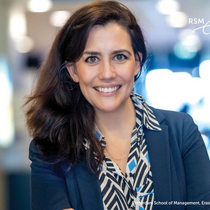Irene Diaz Soto
Nationality: Spanish
Age: 39
Job title: senior technical expert lead at Save the Children
Previous studies: bachelor in journalism with focus on international public law at Universidad Complutense Madrid, and an executive master in non-profit leadership at Seattle University

1. Why did you choose to go back to school for an MBA?
“My background is philanthropic work in the non-profit sector, specifically economic development, and empowerment of communities. I strongly believe the private sector can be and is a game changer for a more equal and sustainable world, but often just tick the boxes they need to for their contribution. I want to use my expertise to make a positive change to business. RSM’s mission and values are aligned with my purpose as a professional. The School’s international and inclusive approach appealed to me too: people are from all kinds of different backgrounds and sectors. I didn’t see this as much in interviews at other business schools. Also, RSM’s curriculum isn’t traditional. It’s got the components of leadership and sustainability that I was looking for''.
2. How is the Executive MBA preparing you to do business in a world in motion?
“I’m learning valuable business language and practice. I’m translating my purpose across different levels and sectors. I’m learning transferable skills that I can utilise to have a more meaningful impact. The world is changing, but many people still live in a traditional setting where we reinforce the status quo. Yes, people have access to the fast-paced digital world and information, but we seem more disconnected that ever. As for climate change: we can do better individually from a northern hemisphere perspective, but we do not see the most affected are those in vulnerable situations that do not have as much possibility to decide on their use of goods, for example forced migrations due to drought. We are all responsible. The private sector can act more towards including transformational policy change globally, not only on resources use but also on human and labour rights. I want to steer that in the right direction by combining my experiences.”
3. How would you describe your RSM MBA experience so far?
“It’s intense to say the least. It’s a constant learning journey. Not only from the programme’s curriculum and assignments, but also from my peers’ perspectives. People don’t do the programme because they have to but because they want to. Everyone wants to improve their skills. It’s really positive to be here.”
4. What’s the highlight of the curriculum for you?
“I enjoyed accounting management, which was quite new for me because I don’t have a finance or accounting background. But I liked the qualitative analysis approach of company performance, and the case studies are interesting. I’ve also put a lot of the leadership courses into practice already, for example coaching and working with teams. It’s helping me to get the best out of people.”
5. What impact does the Personal Leadership Development (PLD) component of the programme have on you?
“It’s a journey for sure! There’s a lot of self-reflection about personal behaviour and decisions, and how this affects you professionally too. I understand better why I make decisions and how they may impact others. I already had a purpose set out for myself and my career before the EMBA, and this is a confirmation that I’m on the right track.”
6. How is an MBA from RSM setting you apart from your colleagues and peers?
“Most people in the NGO world don’t think about doing an MBA. There are fewer means and less willingness to learn business language. There’s more focus on impact, it’s just a different lens. An MBA is more important in the business world because it’s more about profit. But, profit doesn’t mean you can’t make an impact, and vice versa. It can go hand in hand. You can make a profit and have a positive effect on climate, social justice and human rights.”
7. Has your MBA journey changed your outlook on your career?
“My work is all about equity, ethical development and labour rights. I want to use my expertise to advise and contribute more to business and ethical right principles at companies. When I joined the EMBA I had the purpose of merging the non-profit into business. Now that I’m in the programme, I can see how it can be more specific. I chose a lot of the sustainability and meaningful leadership electives, for example leading with presence, sustainability and the circular economy.”
8. What does the future hold for you?
“I want a more integrated approach and move away from the non-profit world and move towards social business with an ethical approach. It could be a multinational as long as there’s a clear philanthropic purpose. I want to show that it can be much more meaningful than to tick ESG boxes. I want to understand the corporate world and make an impact when I merge my expertise with the business world.”